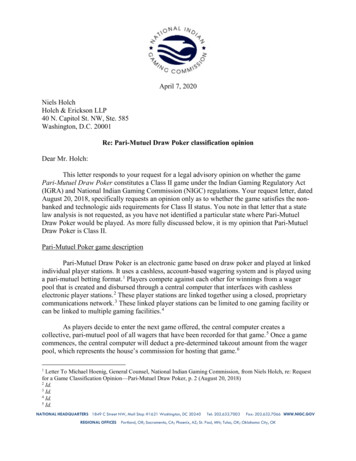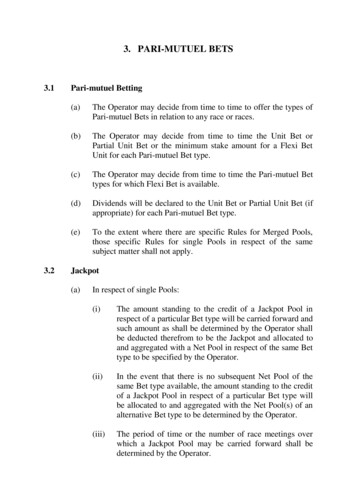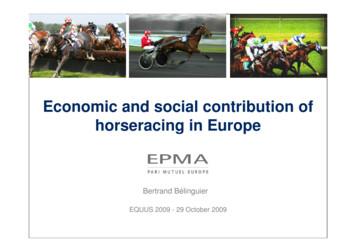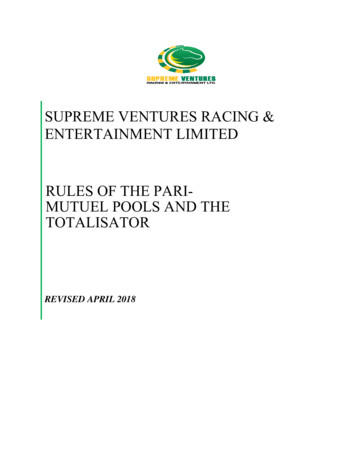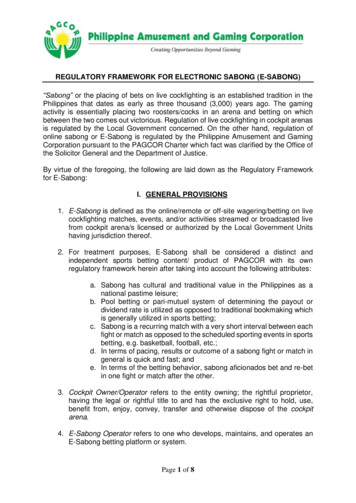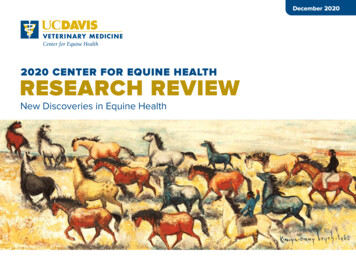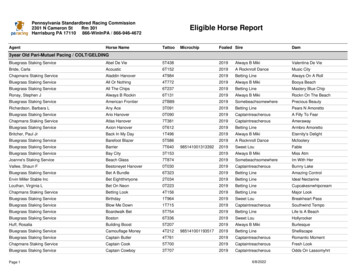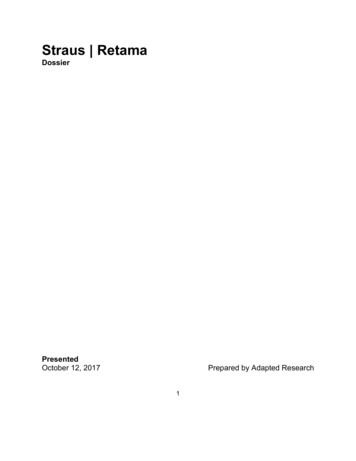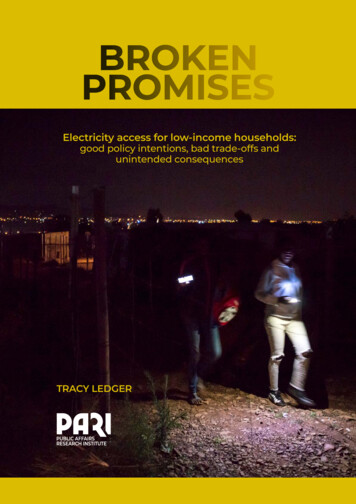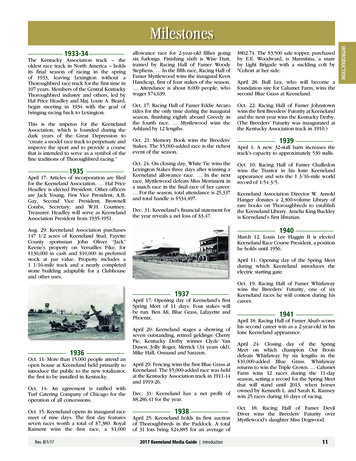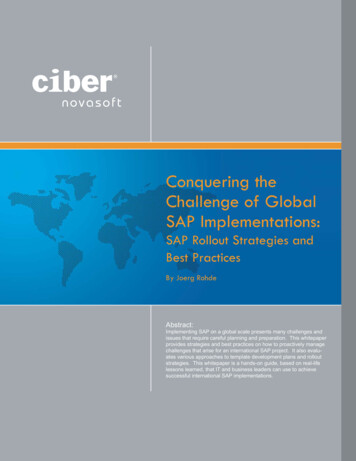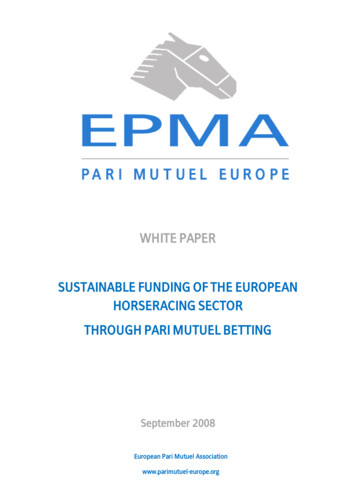
Transcription
WHITE PAPERSUSTAINABLE FUNDING OF THE EUROPEANHORSERACING SECTORTHROUGH PARI MUTUEL BETTINGSeptember 2008European Pari Mutuel Associationwww.parimutuel-europe.org1
FOREWORDFrom the EPMA Board of DirectorsOur Association is young but our experience as gambling operator is considerable. Based onour knowledge, this reference document has the objective to spread our messages andcontinue to position ourselves on the legal and economic scene of the gambling sector.EPMA members hope to share their aims with European decision-makers: to provide fairservices and to preserve part of European cultural know-how.It is well timed as European Member States and the European Parliament will debategaming and gambling issues during autumn 2008.With a view to educate and inform, we, the European Pari Mutuel operators, have collectivelywritten this document and are supported in this by many European horseracing authorities.On behalf of the entire membership of EPMA, we sincerely hope that this White Paper willserve as a useful tool in the political and regulatory debate on the future of gaming andgambling sector in the European Union.Bertrand Bélinguier,Remy NilsonTrevor BeaumontPresident PMUChairman of EPMACEO ATGTreasurer of EPMAExecutive Director UK TotalisatorAlexis MurphyMattis AsplinAntonio TagliaferriCEO Tote Ireland LimitedPresident Norsk RikstotoGame Director AAMSEPMA members in Stockholm – April 20082
MESSAGE FROM THE HORSERACING AUTHORITIESInternational Federation of Horseracing AuthoritiesHorseracing is interlinked with betting almost anywhere in the world and as authorities, we pay muchattention to the way it is organised. It is the foremost contributor to the financing of our activity and itgives us the best possible guarantee for ensuring the integrity of the sport.In the vast majority of countries around the world, the pari-mutuel model is the main, if not the onlyform of betting. Contributions from pari-mutuel betting have allowed us to develop horseracing into animportant economic activity that employs several thousand people in Europe.Racing authorities work in close relationship with pari-mutuel operators and we welcome the creationof a European organisation of pari-mutuel betting operators to promote their activities and to ensurethat policy makers understand what pari-mutuel means to our sport and adopt proper and fair laws.We trust that the EPMA White Paper will provide useful information for European decision makers andregulators in their legal approach of the market.Louis RomanetIFHA ChairmanEuropean Trotting Union: UETMembers from 18 countries organising trotting races in Europe signed a Declaration on January 2008asking "to support the lawfulness of the races and fairness and transparency of the betting, and touphold the mutuel betting system in our countries." The Declaration, sent to national and Europeandecision makers is clearly supporting the Pari Mutuel operators.Europe’s trotting sector represents 65 000 races each year on 400 racecourses, with the participationof 73 000 horses. The total turnover of betting on trotting is 7 billion annually. Approximately 15 % isgiven back as payment for the service providers in horseracing, as prizes, payment for the tracks andpersonnel, promotion of breeding and other necessary purposes and costs.The economic and socially responsible attitude of the Pari Mutuel operators, as enhanced in this WhitePaper, should be preserved and taken into account by our governments when adapting regulations toeconomic and technological changes.Patrik SANDINPresident of UET3
EXECUTIVE SUMMARYThe European Pari Mutuel Association brings together leading operators present in 10countries. As historically experienced actors in the gambling sector, they are entitled tosubmit their views and position on the development of the gambling sector. In this WhitePaper, the EPMA describes the challenges currently faced by the European horseracingsector.As betting operators, Pari Mutuel organisations have a dual objective, offering thebest entertainment value to bettors in a fair and moderate way and serving theEuropean horseracing industry in its long-term development. A large majority ofhorseracing organisations have acknowledged the benefits of the Pari Mutuel modelas the best tool to preserve and develop their industry.Member States have started a dialogue on the subject of gaming and gambling with the aimof agreeing on a political document to promote their common interests on the subject. EPMAsupports this approach hoping it will create the conditions for adherence to the followingcommon principles:Guaranteeing the right for Member States to define a national legal frameworkassessing the model on which betting is organised. Each Member States can define under a licensing system the variousrequirements essential to respect at national level.Member States can promote the betting model corresponding to public orderand funding national priorities such as Pari Mutuel on horse racing.National rules must avoid tax competitionRecognising the right of sport event organisers to get a fair return on bettingrevenues generated. Create a regime for sports betting that enables a fair return to sports for theuse of their events by betting operators.Promoting the sport by preserving integrity. Supporting the approach of the Sports Rights Owners Coalition – have thepossibility to ban betting on an event or to control the various forms of betting(ban intra-event bets, side bets etc).Considering the costs of addressing integrity risks by providing relevantfunding and not diverting resources away from training, social structures, ruraldevelopment, etc.Implementing obligatory responsible gaming rules. Organise the measurement and apportionment of the costs to gambling.Fund social and medical analysis to set up the best prevention mechanisms.Organising coordination of Member States to control illegal betting activitieswith strict legal penalties.4
Invented in 1864 to reduce the risk level of bet taking and to facilitate the processing of bets,Pari Mutuel has become the most widely used form of betting on horse racesaccounting for 78% of horserace betting in the world. In Europe in 2007, it totalled 14billion. Out of that sum, more than 11 billion returned to the winning punters and asmuch as 1.5 billion was reinvested in the European horse industry and racing, aconsiderable investment which represents more than 200 000 people directlyemployed by the sport. These figures can be doubled if all indirect employment is takeninto account, often at the crux of regional development (Normandy, County Kildare, etc.).Compared with other sports, horseracing mainly relies on betting revenue, which canbe explained by the early introduction of betting legalisation and the recognition of the right ofhorseracing to benefit from this revenue. In addition to this historical link, both activities havedeveloped symbiotically, particularly for Pari Mutuel operators, which are often set up andsupervised by the racing authorities.A socially and economically responsible attitude of the Pari Mutuel operators hasgrown over the years in order to respond in a moderate way to the demand of theplayers and to ensure the long-term sustainable development of the sport. The valuesof the Pari Mutuel model, transparency, neutrality and integrity, as well as fairnessamongst punters, are now being examined by other sports federations and Olympicorganisations.Newcomers on the gambling market have not been subject to the same requirements fromthe start and have developed their activities according to a completely different economicmodel. As a result, the different “players” on the European market are not competing on thesame basis and do not share the same objectives.To reach the same level playing field for all actors on the market, Members Stateshave to modernise their approach to gaming and gambling. National legislation,which has regulated the market for more than 100 years, has to adapt to the evolution.To respond to this technological and economic transformation, a thoroughanalysis of the benefits and risks brought about by these changes must beassessed at national and European level.Although gambling activities have been considered by many as a normal service, it involvesinternal risks that cannot be ignored by legislators. European decision-makers are now in theposition to evaluate those risks and lay down common principles so that the market candevelop properly.EPMA members hope to share their objectives with European decision-makers: to providefair services and to preserve part of European cultural know-how.For this to come about, Pari Mutuel operators continue to innovate without, however, losingtheir raison d’être.5
European Key figures - 2007 30 billion for the total betting activity onhorseracing: 14 billion collected by EPMA Members: 11 billion returned to the winning bettors 1.5 billion returned to the horse sector20 million bettors100 000 horse owners40 000 breeders200 000 people directly employed500 racecourses80 000 horse races110 000 different racehorses involvedPari Mutuel is globally the most widespread form ofbetting on horseracing, accounting for 78% of bettingstakes worldwide.Except for the UK and Ireland, Pari Mutuel is thedominant or exclusive betting model of the majorhorseracing nations.Contact EPMA : contact@parimutuel-europe.org6
TABLE OF CONTENTSFOREWORDMESSAGE FROM THE HORSERACING AUTHORITIESEXECUTIVE SUMMARYINTRODUCTION23481-THE BENEFITS OF THE EUROPEAN HORSERACING SECTOR AND ITS NEED FOR BETTING REVENUE9A)The benefits of the horseracing sector in Europe9B)The Horseracing economic model10C)An original funding system through betting revenue122-3-4-EPMA OPERATORS HAVE DEVELOPED A MODEL ENSURING A PROPER FUNDING OF HORSERACINGWHILE PROVIDING A FAIR, RESPONSIBLE AND ATTRACTIVE OFFER TO PUNTERS15A)The internal values of Pari Mutuel15B)EPMA members : a Corporate Socially Responsible attitude16C)The vulnerability of the system18CHALLENGES ARISING FROM THE INTERNET AND THE NEW EUROPEAN CONTEXT20A)New actors and new forms of betting20B)Online operators take advantage of an uncertain European regulatory framework21PERSPECTIVE AND PROPOSALS23A)Consistency of action at EU level23B)The same level-playing field for all actors at national level24ANNEXES251 - The European Pari Mutuel model in practice252 - Funding for British horseracing277
INTRODUCTIONThe leading European Pari Mutuel operators have joined together to promote their businessmodel, the Pari Mutuel system for betting as a vital support for the horse sector in Europe.Members of EPMA are present in 10 countries, traditionally active in developing horse racesand horse breeding: Austria, Finland, France, Germany, Ireland, Italy, Norway, Sweden,Switzerland and the United Kingdom. They have developed efficient tools for a sustainablefuture of the horseracing sector and fairness and protection for consumers. Out of a turnoverof 14 billion collected by EPMA members in 2007, played by more than 20 million punters,more than 11 billion returned to the winners and 1.5 billion were paid to the horsesector. The sector is of great importance from an economic, ecological and cultural point ofview with more than 40 000 breeders in Europe and 200 000 people directly employedcontributing to a great extent to rural development.Recent changes in the European betting market brought about by Internet gambling andlegal developments put forward by the European Commission and national governments arechallenging traditional betting operators with an impact on the European horseracing sector.EPMA members, as responsible actors, want to provide an overall understanding of theimportance of the horseracing sector in Europe, the way it operates through betting fundingand demonstrate how Pari Mutuel has become the most appropriate partner of the industry.Benefiting from long-standing experience, EPMA members have pooled their commonknowledge of the market and submitted proposals for a sustainable future in a changingEuropean context.8
1- THE BENEFITS OF THE EUROPEAN HORSERACINGSECTOR AND ITS NEED FOR BETTING REVENUEEuropean horseracing is a truly competitive sport aimed at improving horse breeds throughcompetition. It is organised locally by horseracing bodies and processed by a whole verticalindustry. The horseracing sector was originally interlinked with betting activities which are itsmain source of funding.A) THE BENEFITS OF THE HORSERACING SECTOR IN EUROPEHorseracing plays an important role in the European sporting landscape and its benefits canbe perceived in other economic sectors due to the activity it generates. Moreover, in manycountries it is considered as an integral part of social and cultural life with a long tradition andimpacts on the agricultural, environmental, educational and leisure sectors.Sport and its economic impactEurope is the birthplace of horseracing. It is unique as it offers races in the three disciplines,flat, jump and trot. It plays an important role worldwide with top races and world champions.More than 80 000 horse races are organised yearly in Europe on almost 500 racecourseswith 110 000 different racehorses involved per year1.European racing is broadcast all over the world including the US, Australia, South Africa andHong Kong. The Prix de l’Arc de Triomphe, the flagship of French gallop racing, can be seenin 200 countries and is broadcast to 200 million households.The horseracing industry directly employs more than 200 000 people in Europe2 with a largevariety of jobs including breeders, trainers, jockeys and drivers, stable staff, employees ofthe betting sectors, etc. Thousands of indirect jobs can be added to the total.Horseracing supports a flourishing betting activity with 30 billion stakes in 20073.Turnover of horses sold privately and at public sales total more than 800 million forthoroughbreds only annually4. European-bred horses are sold to many countries outsideEurope such as the United Arab Emirates, the United States, Japan and China (Hong Kong).1EPMA figures 2007 (all figures in the document correspond to the European market unless specified).2IFHA and UET figures.3IFHA figures 2007 adding bookmaking and Pari Mutuel turnover for the European market.4European Federation of Thoroughbred Breeders Associations (EFTBA) 2007.9
Cultural and ecological benefitsEvery day, millions of horse lovers and bettors view races across Europe. Betting on horseracing is a traditional leisure activity for people in many countries with more than 20 millionbettors in Europe. Horseracing bettors enjoy a challenging game which mixes luck andexpertise with the opportunity to socialise at betting outlets and on the web.Horseracing as a sport encourages social cohesion. For instance, the Grand National inGreat Britain or the Elitloppet in Sweden are considered national events.Horseracing is such an attractive sport, that many European horseracing associations arenon-for-profit associations and most of their stakeholders are volunteers.Horses contribute to the preservation of rural landscapes. The economy of rural Europeanareas such as Normandy in France or County Kildare in Ireland is strongly linked to the horseracing sector. Horse feed is produced locally and contributes to jobs and the demand foragricultural products. At least 100 000 hectares of grassland are used for thoroughbredhorses alone5. Such land would not have any economic use otherwise.The horse breeding industry also results in the protection and promotion of existing breeds(maintaining the diversity of breeds such as cold-blooded horses in the Scandinaviancountries).B) THE HORSERACING ECONOMIC MODELCreating a top champion and organising high-level races take years, investment andexpertise in breeding, training and riding. The small to large-scale structures involved needadequate resources in order to thrive and develop. Their work is mainly funded by owners.The owners and covering costsThere are more than 100 000 owners6 in Europe who need to cover the costs of acquiring,stabling and training their racehorses, with a wide diversity of economic situations: fromrenowned stables owned by a single person to horse syndicates with dozens of peoplesharing a single horse through the rural family business. The price of a horse can varyconsiderably and ranges between 10 000 to 50 000 on average7. Stable costs per horseare also high from 1 000 to 1 800 /month.The aim of the owner is to maximise the money earned through prize money (amount paid bythe horseracing associations to winning horses) in races and other activities directly linked tothe performance of horses in racing such as breeding and horse sales.5European Federation of Thoroughbred Breeders Associations (EFTBA) 20076IFHA and UET figures7August 2008 yearling sale in Deauville reached the average of 111 000: www.arqana.com10
Prize money, which accounts for large amounts per year in the main racing countries ( 350million in France - 155 million in UK), while only partially covering financial needs, isdecisive in any decision to continue racing. The percentage of stabling and training expensescovered by prize money won per horse ranges in the main European racing countries from56% in France to 24% in the UK.Racing management costsHorseracing authorities which organise racing also provide large investment and supportoperating costs.Racecourses represent important capital investment. For example, 350 million between2004 and 2006 for the redevelopment of the Ascot racecourse8.Like other sport federations, the horseracing authorities are responsible for providing prizemoney to competition winners with a total of more than 1 billion9 paid in 2007. As far asthe Grand Prix are concerned, the horseracing authorities compete with ever-increasing prizemoney to attract the best champions worldwide and to make their racing industry among thebest. Offering attractive prize money prevents owners from selling or exporting their besthorses to countries such as Hong Kong or the United States where purses are especiallyhigh (cf. Breeders’ Cup).The highest prize money at racing events in 2008 - comparison with major sporting eventsOTHER SPORTSEuropean EventsHORSERACING EVENTSIn million ofUS In million ofUS Breeders’ Cup (USA)2423.5Dubai World Cup Festival21,2Roland Garros21,8Melbourne Cup Carnival16The British Open (golf)8.5Japan Cup weekend8.1US Open (golf)7.5Prix Arc de Triomphe weekend (F)9.4US Masters (golf)7.2Royal Ascot7Tour de France (cycling)4.5Cheltenham Festival (UK)6Grand National Meeting (UK)4.3(2007) Wimbledon (tennis)8Ascot redevelopment facts and figures www.ascot.co.uk9IFHA Figures 2007(2007)(2007)11
C) AN ORIGINAL FUNDING SYSTEM THROUGH BETTING REVENUEThe economy of the horseracing sector is mainly supported by bettingThe European white paper on sports covers the various ways of funding sport through publicor private sources. Among the most common sources of revenue are: Media rights, Sponsorship, Hospitality (tickets, food and drink, etc.).Moreover, the Commission document stressed the importance of funding in the variousMember States, “through a tax or levy on state-run or state licensed gambling or lotteryservices. The Commission invites Member States to reflect upon how best to maintain anddevelop a sustainable financing model for giving long-term support to sports organisations.”10To start reflection on this issue, the Commission will launch an independent study at the endof 2008.Revenue breakdown for global sports market and selected sportsHorseracing 65% proportion of totalrevenue derived from betting23%51%43%65%40%30%20%20% contribution made byowners of racehorses15% includesRaceday/Matchday,broadcast and othercommercial lGlobal sportsmarketBig 5'EuropeanfootballleaguesBritish RugbyUnionNFL hdaySource: Deloitte 200610thThe White Paper on Sport COM (2007) 391 - 11 July 200712
Unlike most other sports, in the case of the horseracing industry, the early legalisation ofbetting and the recognition of the horseracing’s right to benefit from its revenue mean thatbetting is the main source of income for the sector.Horseracing process and revenueHorseracing industrial al activitiesbroadcastingHorseracing and betting have always been linked.As early as 600 BC in Rome, bets were placed on horse races. The first modern Englishgallop races were subject to betting in the 17th century and, at the same time in Scandinavia,the first bets on trotting appeared (the first carriage to arrive at the church).Horseracing is a natural support for betting: Large numbers of runners making it a challenge to pick the winner(s) (as opposed toother sports with only two teams or sportsmen per event),Races, lasting for a short period of time with an emotionally intensive finish, caneasily be followed from start to finish,Racing allows for a large variety of types of bets involving one or more runners andone or more races.13
Betting on horseracing was gradually made legal in most countries at the end of the 19th andthe beginning of the 20th centuries: France in 1881, Germany in 1922, Sweden in 1923,Norway and Finland in 1927, Italy in 1931, 21 states of the USA in the 30s, etc. Horseracingassociations have in most cases been granted exclusive rights to organise betting or rights tothe revenue generated.At the same time, racing has evolved to fit betting requirements Permanent improvement of horse breeding to provide racing champions, Handicapping and other measures to ensure truly interesting competition, Growth in the number of races open to betting with one race organised worldwideevery three minutes, Development in betting networks of simultaneous broadcasts of race meetingsorganised on different tracks nationally or internationally, etc.The horserace funding model based on betting is now being examined by other sportfederations in need of supplementary resources (French professional football league11,Fédération française de Tennis, etc.).11Interview of F .Thiriez, President of FLP– by Paris Match 8/06/200814
2- EPMA OPERATORS HAVE DEVELOPED A MODELENSURING A PROPER FUNDING OF HORSERACINGWHILE PROVIDING A FAIR, RESPONSIBLE ANDATTRACTIVE OFFER TO PUNTERSOn March 6, 2008 at the European Parliament in Brussels, the European horseracingindustry asked for a guarantee of: a fair return from betting on horse races on which bets are promoted or offered, the protection of the future integrity of the sport.A large majority of horseracing stakeholders have acknowledged the benefits of the Parimutuel model as the best tool to preserve and develop their industry.A) THE INTERNAL VALUES OF PARI MUTUELIntegrityPari Mutuel is a form of betting with certain internal values which guarantees the integrity ofthe sport. Indeed, with Pari Mutuel betting, the amounts bet are added together and sharedamong the winners, after the take-out of the operator which is completely independent of theresult of the race. The Pari Mutuel operator has therefore absolutely no interest in theoutcome of the race.TransparencyPari Mutuel betting ensures transparency through: the application of equal treatment of punters, the implementation of predetermined rules to establish the share of total betsthat will be returned to winning punters, the operator’s ability to put all the information available at the disposal ofpunters without weakening his position.Comparison with other forms of bettingThe bookmaker bets against punters which involves a risk. Even though he tries to balancethe books, his profitability will differ depending on the result of the race.The Betting Exchange (Internet only) allows the broader public to act as a bookmaker. Thismeans that individuals can take odds (ie: "back") on the outcome of any event. Equally,they can offer odds "lay" to other participants. The technology automatically matches back15
and lay bets between various bettors – a percentage of winning bets being taken by theoperator. The system makes it possible for individuals to bet on a horse to lose a race.B) EPMA MEMBERS : A CORPORATE SOCIALLY RESPONSIBLE ATTITUDEGambling operators have many responsibilities in the economic sector in which they operate:a responsibility towards customers, partners/shareholders and society as a whole.EPMA’s members take advantage of Pari Mutuel for the benefit of punters and the sport ofhorseracing. Beyond legal obligations, EPMA’s members are committed to maintaining abalance between their economic objective and social responsibility and are thereforepromoting responsible gaming behaviour and the funding of racing.Many newcomers on the market, on the contrary, have a tendency to exploit loopholes inlegislation.EPMA’s members respect strong ethical principles:-Observe strict compliance with legal frameworks-Develop and improve responsible gaming toolsOver the years, national Pari Mutuel operators have developed a strong andconsistent programme to promote responsible gaming through various campaigns(information for punters, network training, awareness campaigns, anti-addictionsystems on websites and links to associations dealing with compulsive gambling).Some examples: -PMU in partnership with La Française des Jeux are providing more than 1million for the next three years for specific research and centres for theprevention of addiction to provide better therapeutic guidance to deal withpathological gambling in France.The advertising budget is deliberately limited for all EPMA members – lessthan 0.5% of turnover. In Sweden, national operators are contributing to astudy on the influence of advertisement on addiction. UK Tote adheres to theGC’s Gambling Industry Code of Practice for Socially Responsible Advertisingwhich provides social responsibility standards for gambling operators to applyto their advertising.Respect the integrity commitment EPMA operators only enable betting on successful results. This makes itdifficult to fix a race as it would need the acceptance of all the participants.Integrity of betting and racing is a key condition for ensuring the continueddevelopment of betting. For this purpose, close cooperation with racingauthorities has been developed and promoted.EPMA’s operators are strictly controlled by their own State which ensures thatthe processing of bets is done in complete transparency.16
-Fund horseracing in a maximised and predictable way Large pools and no risk taken give rise to a wide range of types of bets,notably bets offering life-changing dividends attracting new punters tohorserace betting.More than 10% of stakes in certain countries are paid to the horse sector; 1.5 billion was returned to the sector in 2007 (see table below).Harmonious funding of racing throughout a territory and of racing disciplinesacross the country.Optimisation of operating costs.Contribution to the funding of other components of the equestrian sector(Olympic teams, equestrian centres, schools and local development).Contribution from EPMA’s members in 2007PARI MUTUELOPERATORBETTING TURNOVERRETURN TO HORSESECTOR Million MillionPMU8 842727.2UNIRE2 667395ATG1 284149NORSK RIKSTOTO39564FINTOTO20932.5UK TOTE48424.8TOTE IRELAND6110.6GERMAN TOTE TRS858.4LOTERIE ROMANDE732*WIENER TRAB0.60.1214 100.61413.6**EPMA MEMBERSTOTAL*In addition, more that 5 million are distributed to good causes throughlocal non-profit associations (promotion of research, environment,associations to help youth, provide services for elderly and handicappedpersons.).**operating cost included for 5 members (UNIRE, TOTE Ireland, GermanTOTE, TRS and Wiener TRAB)17
-Cooperate among European and international horseracing sectorsEPMA members have developed common pools at EU level. The purpose is toincrease the racing programme, create attractive pool sizes, while preventing puntersfrom participating in uncontrolled betting and continuing to support local breeding andthe racing sector (e.g. PMU and Loterie Romande12, Nordic countries)The EPMA model has been implemented in various ways across Europe depending on localhistory and cultural background as shown in the examples in annex 1. It has provensuccessful in those countries where it is fully implemented.In the UK and Ireland where bookmaking is dominant, funding of the horseracing system isthrough a percentage of gross profits on betting, at an agreed rate negotiated between theparties and supervised by the government (see annex 2). This can cause conflict asbookmakers inevitably look to minimise their contribution to horseracing (and associatedcosts in offering betting on the racing product to their customers) for the benefit of their ownshareholders.C) THE VULNERABILITY OF THE SYSTEMThe symbiotic link between the horseracing sector and betting that the EPMA modelmanages to implement, is a fragile one. If the level of financial return in a given geographicarea falls below expectation, owners will turn to other areas (or cease activities) which maylead to a rapid decrease in competitiveness of the entire local industry and upset the balancein neighbouring areas. On the other hand, poorly funded racing leads to low betting aspunters want large field races with challenging competition. Low dividends discourage bettingbecause punters also want attractive winnings.Vulnerability of the “ecosystem”Fall inbettingdividendFall inBettingturnoverFall inPrize MoneyDecrease intop qualityrunnersDecrease inthe qualityof racingFewerpunters12PMU implemented original and successful cross-border cooperation with French-speakingSwitzerland where, since 1991, the Loterie Romande has offered common pool betting on Frenchracing. This activity, which enab
model, the Pari Mutuel system for betting as a vital support for the horse sector in Europe. Members of EPMA are present in 10 countries, traditionally active in developing horse races and horse breeding: Austria, Finland, France, Germany, Ireland, Italy, Norway, Sweden, Switzerland and the United Kingdom. .
